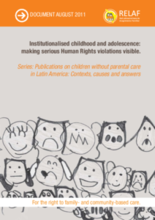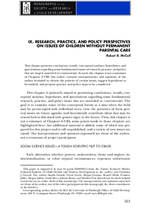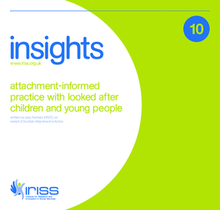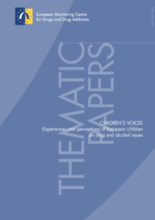Displaying 411 - 420 of 490
This chapter from Monographs of the Society for Research in Child Development Volume 76, Issue 4 first presents a review of research on the development of adopted children, focusing on meta‐analytic evidence and highlighting comparisons between adopted children with and without histories of early adversity.
This monograph reviews literature pertaining to children without permanent parents.
This chapter from Monographs of the Society for Research in Child Development Volume 76, Issue 4 reviews sensitive periods in human brain development based on the literature on children raised in institutions.
Attachment has been assessed in the extreme environment of orphanages, but an important issue to be addressed in this chapter of Monographs of the Society for Research in Child Development Volume 76, Issue 4 is whether in addition to standard assessment procedures, such as the Strange Situation, the lack of a specific attachment in some institutionalized children should be taken into account given the limits to the development of stable relationships in institutionalized care.
This monograph contains nine chapters that review and discuss the empirical literature on the development of children who have been deprived of their permanent parents
This paper, produced by RELAF, is part of a series of publications on children without parental care in Latin America: Contexts, causes and answers. This document, and others in the series, pertains to the broad topic of children without parental care and examines the particular situation of institutionalised children.
This chapter presents conclusions, trends, conceptual analyses, hypotheses, and speculations regarding some fundamental issues of research, practice, and policy that are largely unsettled or controversial, regarding children without permanent parental care.
This toolkit presents a compendium of research on how Albertans think about the issues of early childhood development, and how to increase public support for policies and programs that support healthy child development.
This document stresses the importance of healthy attachments for children, especially looked after children. It provides an overview of attachment theory, presents the policy context of looked after children in Scotland, outlines the evidence on effective interventions for children in care and their families, and highlights findings and practice implications.
The purpose of this paper is to give meaning and insight into some of the key drug and alcohol issues that affect children from the perspectives of the children themselves. Research shows that large numbers of children who are separated from their parents are particularly vulnerable to developing drug and alcohol problems. Special attention is paid throughout the report on children looked after by relatives, foster carers, and institutions.




